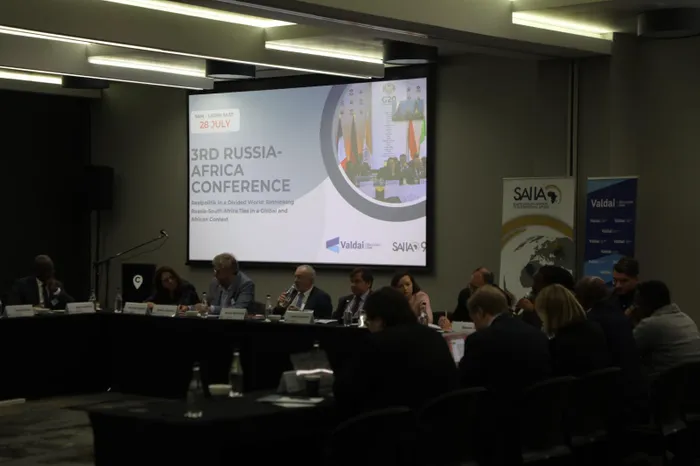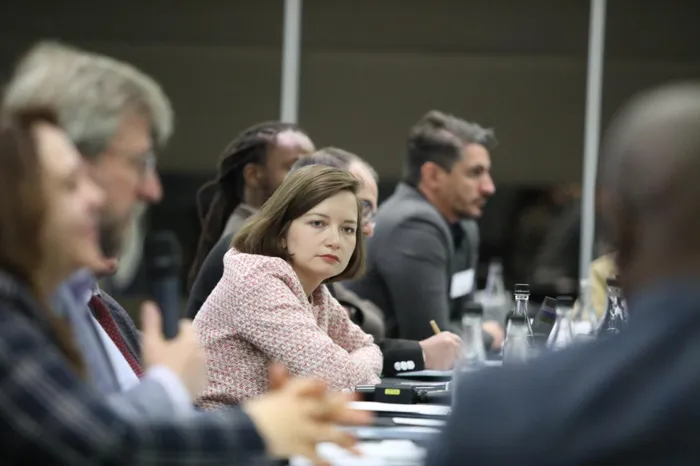
The Valdai Discussion Club in partnership with the South African Institute of International Affairs hosts the 3rd Russian-African Conference in Pretoria titled: “Realpolitik in a Divided World: Rethinking Russia-South Africa Ties in a Global and African Context”.
Image: Oupa Mokoena / Independent Newspapers
The role of BRICS in the world has been hailed as a positive force driving dialogue and creating strategic conditions for development, rather than opposing any particular nation, including the US.
This message was delivered at the Russia-Africa conference, co-hosted by the Valdai Discussion Club and the South African Institute of International Affairs in Pretoria.
The conference, titled “Realpolitik Responses in a Fractured World: Rethinking Russia-South Africa Ties in Global and African Context”, brought together top government officials and academics to share their perspectives on “G20 and BRICS: Assessing Strategic Roles in an Evolving Global Order”.
Dmitry Birichevsky, director of the Department of Economic Cooperation at the Russian Ministry of Foreign Affairs, noted that the BRICS leadership cycle in the G20 has coincided with a strengthening of its economic positions.
“The mounting influence of BRICS has asserted itself as a centre for growth, innovation and one of the main pillars of a new and more just world order,” he said.
He added that BRICS' principles of consensus, equality, and mutual consideration of each other's interests resonate with the growing number of countries in the Global South.
Key issues on the BRICS agenda include making economic governance more democratic and bridging the digital and ecological divide between the Global North and the Global South.
Birichevsky reiterated Russia's support for the South African presidency, saying it has predictably placed G20 emphasis on the African agenda amid the alarming development in the global economy.
Philani Mthembu, executive director of the Institute for Global Dialogue, noted that the recent presidencies of BRICS and G20 have coincided with a rapidly shifting geopolitical landscape, which has heightened the focus on these forums.
He stressed that the low level of participation or absence of the US should not be the only thing on their radar.
“The participation of the US will not make or break South Africa's G20 presidency. The US must be seen in a broader context where the US is pursuing what it views as America first,” he said.
Mthembu added that BRICS should aim to reform international institutions from within while also applying external pressure.

Elena Maslova, associate professor at MGIMO University's Department of Integration Studies, recommended that BRICS delve into issues such as climate change.
Image: Oupa Mokoena / Independent Newspapers
Elena Maslova, associate professor at MGIMO University's Department of Integration Studies, suggested that BRICS should explore topics such as climate change, highlighting the declaration on climate finance as a significant step forward.
“BRICS is gradually becoming a key platform for climate dialogue as well. BRICS should strive to create its single space for climate finance implementation to make it possible to reduce emissions,” she said.
Maslova emphasised that BRICS is not a confrontational tool, but rather a valuable platform for tackling global challenges.
Nourhan ElSheikh, professor of International Relations at Cairo University, stated that the Global South's influence has surged over the past decade, largely due to BRICS and G20, which are driving forces behind the emerging new world order.
“The Global South matters a lot not only for competition among colonial powers but also as a global player in international politics,” she said.
ElSheikh remarked that the Global South has matured to the point where it can identify its own interests, rather than automatically aligning with the US, which is still trying to maintain its global dominance.
“Now we have the Global South saying 'no' and that this is not in our favour or interest and we have the right to choose our way,” she said.
Cape Times